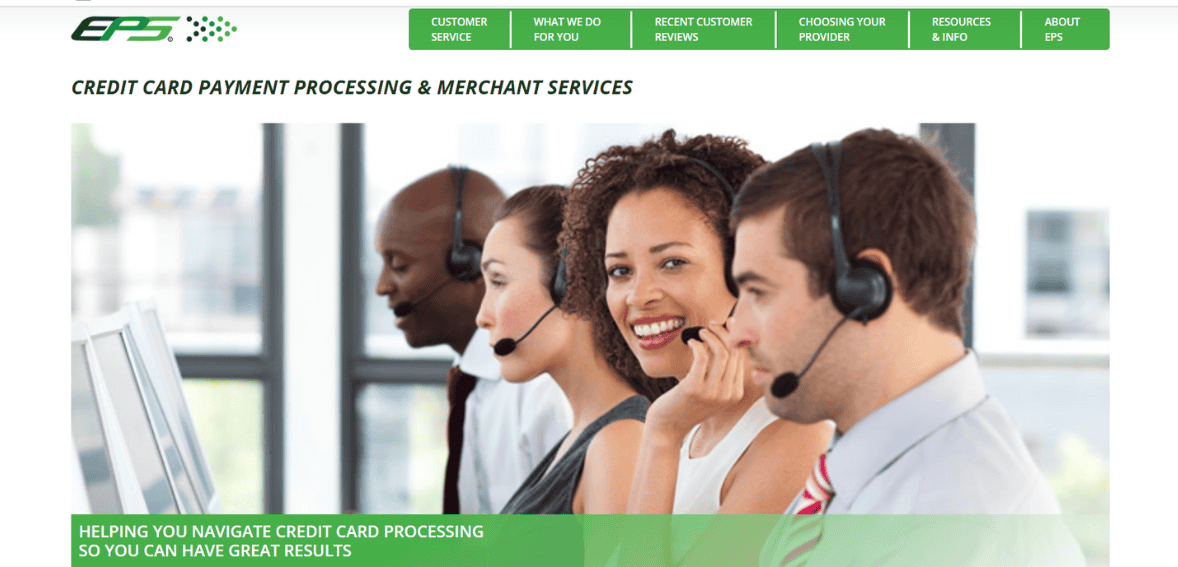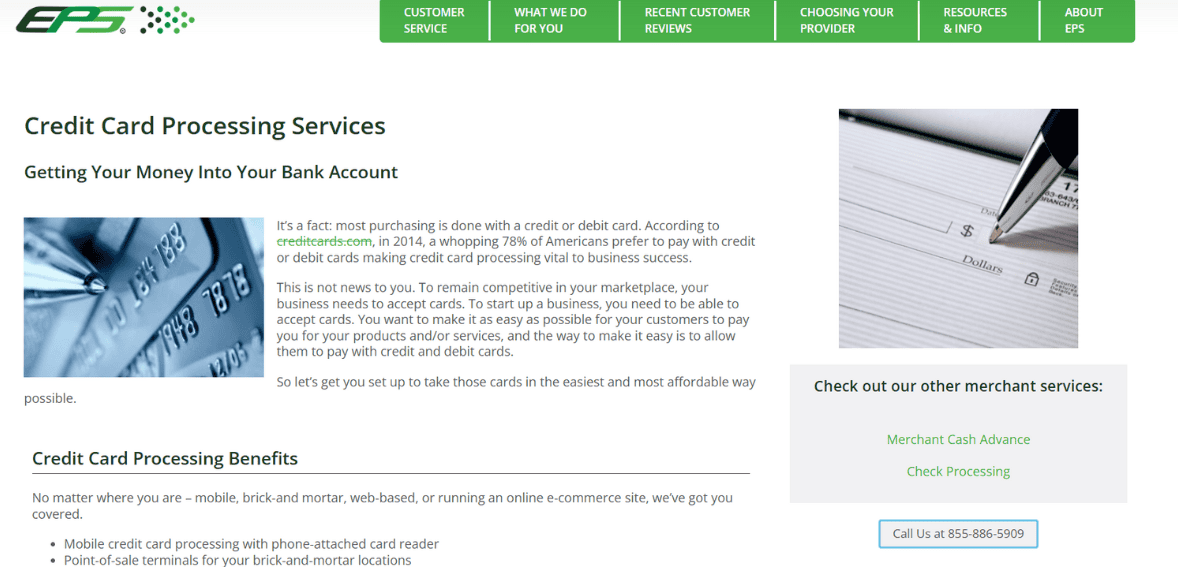
Electronic Payment Systems Review
- 04th Sep, 2025
- | By Linda Mae
- | Reviews
EPS is a merchant services provider that lets you accept payments across multiple channels. In today’s world electronic transactions are the norm, customers expect quick, secure and seamless checkout experiences. EPS aims to meet this by offering a full range of services from point of sale terminals to online gateways. Its positioning reflects the shift of payments from being a back end process to a central part of the customer experience. Lets read more about Electronic Payment Systems Review.
The payments industry has got more complex with contactless cards, mobile wallets and online subscription billing. Merchants face challenges of compliance, cost control and integration flexibility. EPS tries to address these needs by providing reliable infrastructure, security support and scalable solutions. However like any provider its effectiveness depends on the specific needs of each business.
This review looks at EPS from multiple angles, pricing, features, integrations and customer support. Rather than just the sales pitch we look at both the good and the bad so businesses can get a balanced view. With competition in merchant services heating up especially from new fintech players, EPS’s place in the market deserves a closer look.
Table of Contents
ToggleCompany Background and Industry Position | Electronic Payment Systems Review
It has been in the payments industry for many years and has built its reputation with small to mid-sized businesses. As one of the older providers it reflects the traditional model of merchant account services rather than the newer wave of flat rate, app based processors. Its history has given it deep industry relationships and a base of merchants that value reliability and industry expertise.
The market is competitive. EPS is up against the big global players like Fiserv, Global Payments and Elavon as well as the newer entrants like Square and Stripe. While those bigger companies get all the headlines, EPS’s focus is narrower, it caters to businesses that want hands on service and established payment infrastructure. Its reputation is built on dependable processing rather than cutting edge fintech solutions.
The company is not as well known as the newer, tech driven platforms which may impact its recognition with startup and digital native businesses. However its longevity gives it credibility especially in industries that value stability and consistent support. EPS’s challenge in the modern market is to stay relevant while adapting to changing consumer habits, regulatory requirements and competitive pricing.
Core Payment Processing Solutions
At its core EPS allows merchants to accept credit and debit card payments across major card networks. This includes Visa, Mastercard, American Express and Discover as well as ACH for direct bank transfers. EPS’s solutions are for in-store and online environments so merchants can handle multiple types of transactions.
For in-store payments it offers traditional countertop terminals, mobile readers and support for contactless payments like Apple Pay or Google Pay. This allows businesses to adapt to evolving customer expectations around convenience and speed. On the digital side EPS supports secure payment gateways for e-commerce websites with options for recurring billing, tokenization and hosted payment pages.
The reliability of EPS’s core processing infrastructure is a big plus. Merchants report stable uptime and consistent transaction handling which is critical to avoiding revenue disruptions. However compared to some modern competitors the innovation in features feels limited. It meets the basics of processing but doesn’t always emphasize advanced analytics, customer insights or value added services that fintech driven providers tout.
Merchant Account Setup and Onboarding
Like most traditional merchant service providers, EPS requires businesses to undergo a formal application and underwriting process before opening an account. This process typically involves a credit check, business history review, and detailed risk assessment. For some merchants, particularly startups or those in higher-risk industries, this can be more complex than signing up with a quick-approval fintech service.
On the positive side, EPS’s structured onboarding can offer long-term stability. Businesses approved through underwriting are less likely to face sudden account freezes or unexpected terminations, issues that sometimes occur with instant-approval providers. EPS’s approach emphasizes ensuring that merchants meet compliance and risk standards upfront.
The timeline for onboarding varies, often taking a few days to a couple of weeks depending on the type of business. While this may not appeal to businesses needing immediate processing, it provides reassurance to those that value established merchant accounts. EPS’s onboarding team is available to guide merchants through documentation requirements, but some may find the process lengthy compared to faster modern alternatives. Overall, onboarding reflects the trade-off between speed and thoroughness.

POS Systems and Hardware Support
EPS offers a range of POS hardware options tailored to different business environments. These include traditional countertop terminals, mobile card readers for businesses on the go, and full POS systems that integrate with inventory and sales management. Most devices support EMV chip cards, magnetic stripe, and contactless transactions, keeping businesses aligned with current customer expectations.
One advantage of EPS’s hardware solutions is compatibility with multiple payment types. Merchants can accept credit and debit cards, NFC payments like Apple Pay, and even gift card transactions. This flexibility helps businesses serve diverse customer preferences. Additionally, it provides equipment leasing and purchase options, giving merchants choice in how they invest in hardware.
However, compared to more modern cloud-based POS providers, EPS’s systems may appear traditional. While reliable, they may lack advanced features like built-in loyalty programs, customer data analytics, or robust integrations with third-party applications. For merchants seeking only basic, stable hardware, EPS performs well. Those looking for tech-forward innovation might find other platforms more appealing.
Online Payment Gateway and E-Commerce Features
E-commerce has become essential for businesses of all sizes, and EPS provides merchants with an online payment gateway to handle digital transactions. This includes integration with shopping carts, hosted payment pages, and recurring billing features. The gateway allows merchants to securely accept payments from customers shopping online, whether through desktop or mobile devices.
One of EPS’s strengths is flexibility in customization. Merchants can integrate the gateway with their existing websites or use hosted pages for a quicker setup. This flexibility supports both small businesses that need simplicity and larger ones that want tailored solutions. Tokenization features enhance security by protecting cardholder data during online transactions.
While EPS provides the essentials, it faces strong competition from specialized e-commerce processors like Stripe or Shopify Payments, which offer broader developer tools and seamless integration with popular platforms. EPS’s e-commerce tools may not be as developer-centric but remain adequate for businesses seeking reliable and secure online payment functionality.
Security, Compliance, and Fraud Protection
Security is a critical consideration for any payment processor, and EPS prioritizes compliance with industry standards such as PCI DSS. Its systems include encryption and tokenization to protect sensitive customer data during transactions. These measures reduce the risk of breaches and give merchants confidence in their ability to handle payments responsibly.
It also provides fraud detection and monitoring tools, which help merchants identify suspicious activity before it becomes a costly issue. Features may include velocity checks, transaction filters, and alerts for unusual patterns. While not as advanced as AI-driven fraud solutions offered by some newer providers, these tools provide a solid baseline of protection.
Another strength lies in EPS’s support for compliance guidance. Many merchants find PCI compliance challenging to navigate, and EPS assists businesses with meeting requirements. However, the level of support can vary, with some merchants reporting strong assistance and others noting room for improvement. Ultimately, it offers dependable but not cutting-edge security tools, balancing industry standards with practical usability.
Pricing Structure and Fees
Pricing remains one of the most important factors for merchants choosing a provider. It typically uses a traditional interchange-plus or tiered pricing model, depending on merchant needs. Rates vary based on transaction type, card network, and business risk profile. In some cases, merchants may face monthly account fees, statement fees, PCI compliance fees, or gateway charges in addition to per-transaction costs.
Compared to flat-rate providers like Square, EPS’s pricing may feel more complex. However, for higher-volume businesses, interchange-plus structures can sometimes result in lower overall costs. Transparency in fees has been a point of discussion, as some merchants report unexpected charges, while others appreciate the competitive rates once terms are fully understood.
Contracts often include multi-year commitments with early termination fees, which can be a drawback for businesses seeking flexibility. Merchants are advised to review agreements carefully before signing. While EPS offers fair pricing for certain business types, it may not always be the most cost-effective option for smaller merchants or those that prioritize predictability over potential savings.
Customer Support and Service Quality
Customer support is often the deciding factor in a merchant’s experience with a payment processor. EPS provides support through phone, email, and online resources, with representatives available to address issues related to transactions, hardware, or compliance. Merchants have noted mixed experiences, with some praising the responsiveness of EPS’s support and others expressing frustration over wait times or resolution effectiveness.
One advantage is that EPS offers personalized assistance, which contrasts with the automated support channels common among newer fintech companies. Merchants that value speaking with knowledgeable representatives may find this appealing. However, consistency in service can vary depending on the nature of the issue and the time of day support is accessed.
Documentation and training resources are available but may not be as extensive as those provided by larger competitors. Businesses seeking self-service knowledge bases or robust online tutorials may find options somewhat limited. Overall, EPS’s customer support reflects the balance between personal assistance and occasional inconsistency.
Integrations and Compatibility
In today’s business environment, payment processing rarely stands alone. It supports integrations with accounting software, ERP systems, and certain e-commerce platforms. This allows businesses to streamline financial management and reduce manual reconciliation. The flexibility of integrations depends on the type of industry and specific business requirements.
While EPS provides compatibility with many systems, it may not offer the same breadth of developer-friendly APIs and plug-and-play integrations as fintech competitors. This can make it less attractive for technology-driven businesses that prioritize automation and customization. However, for businesses that operate on more traditional platforms, EPS’s integrations are often sufficient.
Compatibility with legacy systems is another advantage. EPS’s solutions are designed to work with established hardware and software, making it easier for businesses that are not looking to overhaul their existing infrastructure. The trade-off is fewer advanced features compared to modern, API-first platforms.
Strengths of EPS
EPS’s key strengths lie in its reliability, industry experience, and wide range of payment solutions. Its long history in the merchant services space gives businesses confidence in its stability. The infrastructure supporting EPS is dependable, ensuring that merchants experience consistent uptime and secure transaction processing.
Flexibility across industries is another advantage. EPS caters to retail, hospitality, healthcare, and e-commerce, offering tools that address both physical and digital payment needs. The company’s structured underwriting process, while sometimes lengthy, ensures merchants have stable accounts that are less prone to sudden disruptions.
Personalized customer support is also an area where EPS stands out. While not flawless, the availability of direct communication channels appeals to merchants who prefer a hands-on approach rather than fully automated systems. It may not always lead in innovation, but its consistency and broad coverage are qualities many businesses value.

Limitations and Potential Drawbacks
Despite its strengths, EPS has several limitations. Pricing complexity is a common concern. The presence of multiple fees, including PCI, statement, and termination charges, can create confusion for merchants unfamiliar with traditional pricing models. Businesses that prioritize simplicity may find flat-rate providers easier to manage.
The contract structure is another drawback. Multi-year agreements with early termination penalties limit flexibility, making EPS less attractive for businesses that want the option to switch providers without financial consequences.
From a technology perspective, it does not always keep pace with newer fintech competitors that emphasize advanced analytics, mobile-first tools, or extensive API ecosystems. For businesses seeking cutting-edge features or heavy customization, EPS may not be the best fit. These limitations do not make EPS a poor choice but highlight that it suits certain business models more than others.
EPS for Different Business Sizes
EPS serves a wide range of businesses, but its suitability depends on scale and industry. Small businesses may find onboarding and contract requirements challenging compared to instant-approval providers. However, once established, small retailers and service providers can benefit from EPS’s stability and hardware flexibility.
Mid-sized businesses often benefit the most, as EPS offers a balance of traditional reliability and cost savings through interchange-plus pricing. These businesses often have the volume to justify more complex pricing structures and can make use of integrations with accounting or ERP systems.
Large enterprises may use EPS as part of a broader payments strategy but may find its technology stack less comprehensive compared to global competitors with more advanced solutions. EPS’s role for larger businesses may be supplementary rather than primary. Overall, it is best suited for businesses that value stability, compliance, and consistent service over bleeding-edge innovation.
Final Verdict on EPS
EPS is a traditional merchant services provider known for reliable payment processing, wide hardware support, and strong security compliance. Its long-standing presence in the industry highlights stability and trustworthiness, making it suitable for businesses across various sectors. However, it faces challenges against modern fintech platforms that offer transparent pricing, faster onboarding, and advanced tools. While it may not be the most innovative or cost-effective solution, it excels in delivering core payment fundamentals. For businesses that value compliance, personalized support, and proven infrastructure over cutting-edge features, it remains a dependable and solid choice for payment processing.
FAQs
Q1. What types of businesses benefit most from EPS?
It caters to industries such as retail, hospitality, healthcare, and e-commerce. It works best for businesses that value stability and traditional merchant account structures.
Q2. Does EPS provide PCI compliance support for merchants?
Yes, it helps merchants maintain PCI DSS compliance and offers features such as encryption and tokenization to safeguard sensitive customer data.
Q3. How does EPS compare with newer payment processors in terms of pricing?
It uses traditional pricing models, which can benefit high-volume businesses but may feel complex for smaller merchants. Newer processors often favor flat-rate pricing for simplicity.
